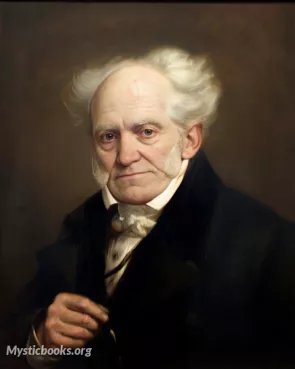
The World as Will and Idea, Volume 1
' The World as Will and Idea, Volume 1' Summary
In the summer of 1813, Schopenhauer submitted his doctoral dissertation—On the Fourfold Root of the Principle of Sufficient Reason—and was awarded a doctorate from the University of Jena. After spending the following winter in Weimar, he lived in Dresden and published his treatise On Vision and Colours in 1816. Schopenhauer spent the next several years working on his chief work, The World as Will and Representation. Schopenhauer asserted that the work is meant to convey a "single thought" from various perspectives. He develops his philosophy over four books covering epistemology, ontology, aesthetics, and ethics. Following these books is an appendix containing Schopenhauer’s detailed Criticism of the Kantian Philosophy.
Taking the transcendental idealism of Immanuel Kant as his starting point, Schopenhauer argues that the world humans experience around them—the world of objects in space and time and related in causal ways—exists solely as ‘representation’ (Vorstellung) dependent on a cognizing subject, not as a world that can be considered to exist in itself (i.e. independently of how it appears to the subject’s mind). One's knowledge of objects is thus knowledge of mere phenomena rather than things-in-themselves. Schopenhauer identifies the thing-in-itself—the inner essence of everything—as will: a blind, unconscious, aimless striving devoid of knowledge, outside of space and time, and free of all multiplicity. The world as representation is, therefore, the ‘objectification’ of the will. Aesthetic experiences release a person briefly from his endless servitude to the will, which is the root of suffering. True redemption from life, Schopenhauer asserts, can only result from the total ascetic negation of the ‘will to life.’ Schopenhauer notes fundamental agreements between his philosophy, Platonism, and the philosophy of the ancient Indian Vedas.
The World as Will and Representation marked the pinnacle of Schopenhauer's philosophical thought; he spent the rest of his life refining, clarifying, and deepening the ideas presented in this work without any fundamental changes. The first edition was met with near-universal silence. The second edition of 1844 similarly failed to attract any interest. At the time, post-Kantian German academic philosophy was dominated by the German Idealists—foremost among them G. W. F. Hegel, whom Schopenhauer bitterly denounced as a "charlatan". It was not until the publication of his Parerga and Paralipomena in 1851 that Schopenhauer began to see the start of the recognition that eluded him for so long.
Book Details
Language
EnglishOriginal Language
GermanPublished In
1818Authors

Arthur Schopenhauer
Germany
Arthur Schopenhauer was a German philosopher born on February 22, 1788, in Danzig (present-day Gdańsk, Poland). He is best known for his work "The World as Will and Representation", which was publishe...
Books by Arthur SchopenhauerDownload eBooks
Listen/Download Audiobook
- Select Speed
Related books

Death-bed Visions by William Fletcher Barrett
"Death-bed Visions" by William Fletcher Barrett is an intriguing and thought-provoking book that explores the phenomenon of visions and experiences pe...

Voyage to Arcturus by David Lindsay
A Voyage to Arcturus is a thought-provoking exploration of the human condition, delving into themes of existence, morality, and the nature of reality...

Some Problems of Philosophy by William James
For several years before his death Professor William James cherished the purpose of stating his views on certain problems of metaphysics in a book add...

Neoplatonism by Charles Bigg
Neoplatonism is a philosophical and religious system that originated in the 3rd century AD. It is based on the teachings of the philosopher Plotinus,...

Confessions of al-Ghazali by Abū Ḥāmid Muḥammad ibn Muḥammad al-Ghazālī
The Confessions of al-Ghazali is an intellectual autobiography in which the renowned 11th-century Persian theologian and philosopher Abu Hamid al-Ghaz...

Elements of Theology by Proclus
Considered one of the most influential works in ancient theology, this book presents a comprehensive exploration of metaphysics, cosmology, and the di...

The Critique of Pure Reason by Immanuel Kant
The Critique of Pure Reason, first published in 1781 with a second edition in 1787, has been called the most influential and important philosophical t...

Religio Medici, Hydriotaphia and Letter to a Friend by Thomas Browne
This collection brings together three of Sir Thomas Browne's most celebrated works: *Religio Medici*, *Hydriotaphia*, and *Letter to a Friend*. Browne...

Initiates of the Flame by Manly P. Hall
Initiates of the Flame is a book about the spiritual flame that nourishes all created things and the initiates who guard it. It explores the mysteries...

Treatise Of Human Nature, Volume 1 by David Hume
This book, published in two volumes called "books" by the author, is a treatment of everything from the origin of our ideas to how they are to be divi...
Reviews for The World as Will and Idea, Volume 1
No reviews posted or approved, yet...